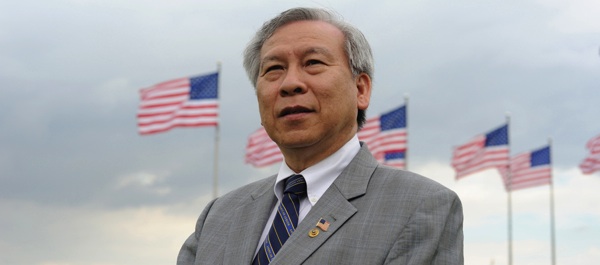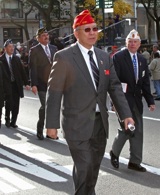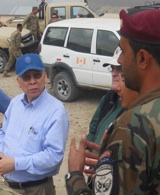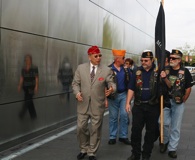10 Questions for American Legion National Commander Fang Wong

American Legion National Commander Fang A. Wong, who too office in September 2011, is a former Army warrant officer and a Vietnam veteran.
Many years ago, the American Legion’s current national commander, Fang Wong, was attending Chinese school in New York City after arriving in the United States from Hong Kong at age 12. When the American Legion came to honor the school’s top students, young Wong received a scholarship and medal. He was so impressed that he wanted someday to become a member of the organization. Years later, Wong not only achieved his boyhood dream of joining the American Legion, in 2011 he was elected to its top post, national commander.
 1. ACG: How did you become the American Legion’s national commander?
1. ACG: How did you become the American Legion’s national commander?
WONG: During the Vietnam War, I volunteered for the service; I loved the life, so I stayed for 20 years. Then after I retired, one of the first things I wanted to do was to join that organization that I had been looking forward to all those years. After I got exposed to the order, service, history and the overall organization, I got moved along into various chair positions. I was elected commander for the state of New York back in 2002, six months after 9/11. After getting exposed to the national operation, they asked if I would consider running for national commander, and last year I finally made it.
2. ACG: What does being national commander mean to you?
WONG: I see myself as the representative and spokesperson, and am also the biggest cheerleader internally and externally. Internally, I am a cheerleader when I visit all the different departments throughout this great nation and meet Legionnaires from all walks of life to thank them for their service, support and activities they perform in their respective communities. Externally, I am the biggest cheerleader in advocacy for the veterans’ issues, representing our 2.4 million members and all veterans regardless of whether or not they are members of the American Legion.
 3. ACG: What are your goals as national commander?
3. ACG: What are your goals as national commander?
WONG: The goals have already been set with the resolutions approved by our National Executive Committee, and also through our annual national conventions. The American Legion has what we call the Four Pillars – the missions and goals that our forefathers set forward at the very beginning in 1919 when the organization was first formed. The Four Pillars basically represent what we call Veterans, National Defense, Children and Youth, and Americanism.
4. ACG: Who is eligible to join the American Legion?
WONG: One day’s active duty with federal armed forces is all that is required. We have been around for 93 years, have 14,000 posts throughout the country, and are more than a veterans’ organization – we become involved in lives and the community. The organization has transformed into the 21st century, and we have a great website at legion.org which amazes visitors when they see what we are involved in – the different legion leaders in different states doing great things. And you see 80- and 90-year-old folks out there still doing things, and the same with those 40 to 50, and now we start getting the 20- and 30-year-olds, the young veterans coming home, joining their community, and buying into what we are doing. The organization is important not just to veterans but also to each community, because in many areas we are a vital part of their community.
5. ACG: Why should those who are eligible join the American Legion?
WONG: We are a big supporter for veterans in the Veterans Administration (VA) and the Department of Defense (DOD) because those are the two main pillars of our program. But we are also the biggest critic of both departments and the government if the policies and practices are not, in our view, up to the standard or acceptable to the best interest of this country or to the veteran. So we play the good guy/bad guy. We go to VA and are critical if their service does not meet what we believe is required. But we also go to Congress and lobby to make sure veterans get proper funding for all their programs. Same thing with DOD – we support them, but we are critical if we believe their policy and practice are not for the benefit of the soldiers.
 6. ACG: What programs would you particularly emphasize?
6. ACG: What programs would you particularly emphasize?
WONG: We’re very concerned about post-traumatic stress (PTS), and we appointed a committee about a year ago to do a study on what some call the signature illness of this war. Even with the technological advancement of medicine, we cannot seem to get a better handle on it. We invited various experts from medical fields and treatment facilities, and we want to come up with our own study and recommendations as to what should be done to get this thing under control so that we can better take care of the warriors. Another issue that we took the lead on last year is recognizing that our current armed forces are no longer just male, obviously, and female soldiers are up to double-digit numbers now. That brings up a lot of subjects as far as health, both mental and physical, so we did the surveys and published findings regarding shortcomings within the government treatment facilities, and the VA is making changes so that female warriors will be treated in an accommodating and suitable fashion.
7. ACG: What is your vision for the future?
WONG: The long-range goal is that we could have a better funding system that will allow the VA more flexibility and resources to provide the kind of services needed to take care of the veterans’ needs. Right now, I know that the resources are not there. But knowing what the warriors have gone through, I believe this country owes them that much, and we need to make sure that in the future the money has to be found, prepared and on time. The other thing obviously is jobs. Veterans need jobs, and it is very frustrating when we cannot get the private sector and the government sector to work together and make it easier for veterans to find jobs.
 8. ACG: What historical leader do you most admire?
8. ACG: What historical leader do you most admire?
WONG: I would say General Patton. He’s straightforward, takes charge the way he sees it, and as a general he’s unbeatable. He just kind of stands out in my mind as what we should be – speak up and do the right thing. Sometimes it might take a little bit of extreme action, but sometimes it’s necessary.
9. ACG: What do you consider the main traits of outstanding leaders?
WONG: I think they have to be honest, straightforward, and should not be afraid of taking any action as long as they know they are doing the right thing. If you believe in what you are doing and are on the right course, then stay with the course regardless of what other people say.
10. ACG: Are you interested in military history?
WONG: Yes, I am interested in China since they have been fighting for 2,000 years in different forms. I am also interested in the Civil War and World War II, having read a lot of novels involving those periods. Some of the things that happened were fascinating, and so that ties in when I have a chance to go to some of the history books, memoirs and biographies of different people, and you can try and relate to it.
John Ingoldsby, president of IIR Inc. (ingoldsbyIR.com), a Boston public relations and media firm, conducted this interview.


0 Comments
Trackbacks/Pingbacks